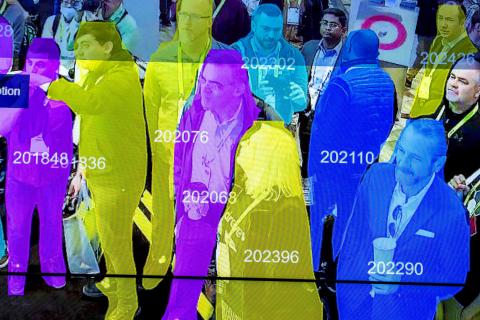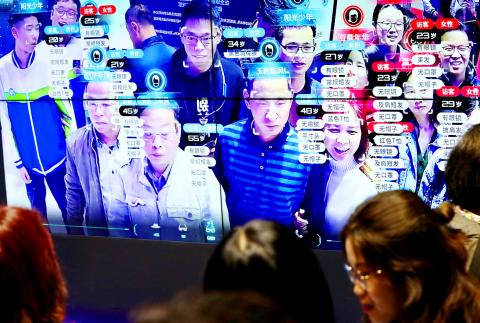Unilever has said it is saving hundreds of thousands of pounds a year by replacing human recruiters with an artificial intelligence (AI) system, amid warnings of a populist backlash against the spread of machine learning.
The system scans graduate candidates’ facial expressions, body language and word choice and checks them against traits that are considered to be predictive of job success. Vodafone, Singapore Airlines and Intel are among other companies to have used similar systems.
Polling commissioned by the Royal Society of Arts (RSA) and released on Oct. 25 suggests 60 percent of the public are opposed to the use of automated decision-making in recruitment as well as in criminal justice.

Photo: AFP
照片:法新社
“New technologies are being adopted at a rapid pace, and regulators and the public are struggling to keep up,” said Asheem Singh, acting head of tech and society at the RSA.
“An increasing amount of decision-making — in our public services, the job market and healthcare — is taking place via ever-more opaque processes. This is a source of anxiety for the general public. The measures we are proposing — such as a new watchdog to scrutinize decisions made by AI on behalf of the public — are crucial first steps in increasing clarity and accountability.”
The RSA panel spent four days examining the spread of AI and automated decision-making into recruitment, healthcare and policing. Members of the panel voiced hopes that algorithms could make fairer, less-biased decisions on things such as pay raises or promotions, and that facial recognition programs might be more objective than human police officers.

Photo: Reuters
照片:路透
But they raised questions about whether automated decision systems would reinforce an organization’s existing profile, for example as traditionally white and male, and how the public would know the technology was being used.
The multinational Unilever is using software from a US-company, HireVue, having first trialed it in 2017. HireVue has previously said the software scans the language that candidates use — for example, active or passive phrases, tone of voice and speed of delivery — as well as facial expressions such as furrowed brows, smiles and eye-widening.
“It is helping to save 100,000 hours of interviewing time and roughly US$1 million in recruitment costs each year for us globally,” said a Unilever spokeswoman. “It is, however, just one of many tools we use for our graduate recruitment.”
She said video interviews were optional and candidates were asked to allow or disallow automated decision-making being used to evaluate their video interview. They were sent information about how to prepare beforehand and could choose to speak to a “talent adviser” instead if they preferred.
The system is now used across Unilever’s entire graduate recruitment program, and HireVue claims it has resulted in a more ethnically and gender-diverse workforce.
Unilever said that at the early stage in the recruitment process when HireVue was used, it was not compulsory for candidates to give their gender or ethnicity so it was not able to provide representative data.
(The Guardian)
儘管機器學習的普及化可能招致民粹主義反撲,聯合利華聲稱,以人工智慧(AI)系統來代替人資部門的徵才專員,每年可節省數十萬英鎊。
對於剛踏出校園的應徵者,該系統掃描其臉部表情、肢體語言和用詞,並檢驗他們是否具有被認為能在職場獲致成功的特質。沃達豐、新加坡航空和英特爾等公司也使用過類似的系統。
由英國皇家文藝協會(RSA)委託,並於十月二十五日發布的民意調查顯示,有百分之六十的民眾反對在徵才和刑事司法中使用自動化決策。
RSA技術與社會事務代理主任阿迅‧辛恩表示:「新技術正迅速被採用,監管機構和公眾都在努力跟上其腳步。」
「我們的公共服務、就業市場和醫療保健中,越來越多決策是透過越來越不透明的過程來進行。這是大眾焦慮的源頭。我們提議的措施──例如新設監督機構來審查AI代替大眾所做出的決定──是提高透明度和問責制的關鍵第一步。」
RSA的專家小組花了四天的時間檢驗AI和自動化決策在徵才、醫療保健和警務方面的應用情形。小組成員表示,希望演算法可以在諸如加薪或晉升之類的事情上做出更公平、公正的決定,也希望人臉辨識程式可以比警察還客觀。
但他們提出了這樣一個問題,即自動決策系統是否會強化組織的既有形象(例如一般是白人及男性),以及公眾是否能夠得知採用了自動決策技術。
跨國公司聯合利華所使用的是美國公司HireVue的軟體,在二○一七年首次試用。HireVue曾表示該軟體可以掃描求職者所使用的語言,例如主動或被動片語、語調和講話的速度,以及皺眉、微笑和睜大眼睛等臉部表情。
聯合利華一位發言人表示:「它每年幫我們在全球節省十萬小時的面試時間,以及約一百萬美元的徵才成本。」「不過,這只是我們用於招募職場新鮮人的眾多工具之一。」
她說線上面試只是選項之一,他們會詢問求職者是否允許使用自動化決策來為其線上面試評分。求職者會事先收到相關資訊,教他們如何準備應試;如果不想參自動化面試,也可以選擇跟「人才顧問」面談。
這套系統現已應用在聯合利華的整個畢業生徵才計畫,HireVue聲稱它已為公司成員的種族和性別帶來了多元性。
聯合利華表示,在HireVue所應用的徵才初期階段,並未強制規定求職者提供其性別或種族之資料,因此無法提供代表性的數據。
(台北時報林俐凱編譯)
Follow Up
讀後練習
True or False
1. The AI job-interview system makes automatic decisions based on analyzing candidates’ facial expressions and language.
2. Similar AI-driven automated systems are already in use within public services and the criminal justice system.
3. The public has embraced AI since it saves time and money and is well-regulated.
4. Compared to humans, AI is able to make fairer and non-biased decisions.
(Lin Lee-kai, Taipei Times)

★ Bilingual Story is a fictionalized account. 雙語故事部分內容純屬虛構。 “Any New Year’s resolutions?” he asked. Lena put her coffee down. “Yeah,” she said. “To get in shape.... round is a shape, right?” Mark chuckled. “I support this. Fully achievable. Low risk.” “Thanks,” she smiled and lovingly rubbed her round belly. “I like a resolution I can’t fail.” “Funny thing is, I was thinking about getting round too.” Lena nodded her head in approval, “You could put some meat on those skinny bones of yours.” Mark shook his head, “Not that kind of round. Wheel-of-Life round.” She raised an eyebrow.

詞法—不定詞的誤用 1. 我得記住星期五要把報告寫好。 ˇ I must remember to finish my report by Friday. χ I must remember finishing my report by Friday. 註︰remember 後面跟動名詞或不定詞表示兩種不同的概念,與 forget 相類似。 試比較下列句子: I remember meeting him somewhere.(我記得曾經在某處見過他。) I must remember to meet him at the station at six this evening. (我必須記住今晚六點得去車站接他。) He remembered turning off the light when he left the room. (他記得離開房間時曾先把燈熄了。) Remember to turn off the light when you leave the room. (記住離開房間時要把燈關了。) 2. 他提醒她做好她份內的事。 ˇ He reminded her to do her job. χ He reminded her of doing her job. 註︰remind ... of ... 後面跟動名詞,表示「使人想起做過某事」。若是「提醒某人應做某事」,應用 remind ... to do ...。試比較下列句子: He reminded me of my attending the lecture last Friday. (他讓我想起我上星期五去聽過那次演講。) He

Skating is a popular recreational and competitive activity that involves sliding over surfaces using specially designed footwear. Its origins date back over 1,000 years to Northern Europe, where people first strapped animal bones to their feet to move across frozen lakes and rivers. In the 17th century, the Dutch transformed skating into a leisure activity. They also replaced bone blades with metal, leading to the creation of modern ice skates. Today, ice skating is enjoyed as a global sport and an exciting pastime by people of all ages. Figure skating is one of the best-known and most graceful forms of skating.

對話 Dialogue 清清:最近天氣越來越冷,感覺很容易感冒,要不要一起去吃薑母鴨或是羊肉爐? Qīngqing: Zuìjìn tiānqì yuèláiyuè lěng, gǎnjué hěn róngyì gǎnmào, yào bú yào yìqǐ qù chī jiāngmǔyā huòshì yángròulú? 華華:最近我覺得有點累,想吃薑母鴨,可是又怕一下子吃太補會上火。 Huáhua: Zuìjìn wǒ juéde yǒudiǎn lèi, xiǎng chī jiāngmǔyā, kěshì yòu pà yíxiàzi chī tài bǔ huì shànghuǒ. 清清:那我們去喝香菇雞湯吧,不太容易上火,喝了也會很暖和。 Qīngqing: Nà wǒmen qù hē xiānggū jītāng ba, bú tài róngyì shànghuǒ, hē le yě huì hěn nuǎnhuo. 華華:聽起來不錯!你們家平常冬天都吃什麼進補? Huáhua: Tīng qǐlái búcuò! Nǐmen jiā píngcháng dōngtiān dōu chī shénme jìnbǔ? 清清:我家都煮麻油雞,吃完整個人手腳都會熱起來。我也很久沒喝香菇雞湯了,正好可以去打打牙祭。 Qīngqing: Wǒ jiā dōu zhǔ máyóujī, chī wán zhěnggè rén shǒujiǎo dōu huì rè qǐlái. Wǒ yě hěn jiǔ méi hē xiānggū jītāng le, zhènghǎo kěyǐ qù dǎ dǎ yájì. 華華:可是我最近在減肥,會不會吃得太補,肉又長回來了? Huáhua: Kěshì wǒ zuìjìn zài jiǎnféi, huì bú